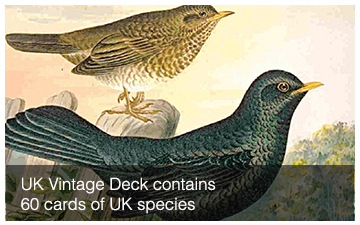Cards
(QUICK LINKS: Decks | plants | mammals | birds | | reptiles | fish | cephalopoda | insects | microbe | events
( scientist | project | modifier | technique |)

UK VINTAGE DECK
STARTER DECK
Deck Home | Download | Purchase
This 60 card Starter deck collects UK organisms illustrated with vintage pre-1913 illustrations. Images are from wiki commons or from the Biodiversity Heritage Library. Please let us know if any copyright error has been found.

MUSEMON DECK
STARTER DECK
This deck is composed primarily from art submissions obtained from the readers of MUSE magazine, as well as special event cards depicting MUSE characters in various funny settings! Playable as a stand alone deck.

LONDON NHM DECK
SCAVENGER HUNT DECK
This deck includes a variety of organisms that can be found as speciment exhibits in London’s Natural History Museum. Happy hunting!

WSF CORAL REEF DECK
Home Card
The WSF Coral Reef Deck was produced in collaboration with the 2012 World Science Festival‘s coral reef exhibit, Reefs As Never Before Seen. The exhibit premiered on May 31st, 2012, at the American Museum of Natural History in New York City.

Cyanobacteria
Prochlorococcus spp.



2 POINTS
Play: Prochlorococcus is a PLANKTON SPECIES.
Fact: This is possibly the Earth’s most plentiful species & accounts for an estimated 20% of the oxygen in the atmosphere.

BEATY BIODIVERSITY MUSEUM
Home Card
Discover over 2 million specimens under one roof, including the largest blue whale skeleton on display in Canada.